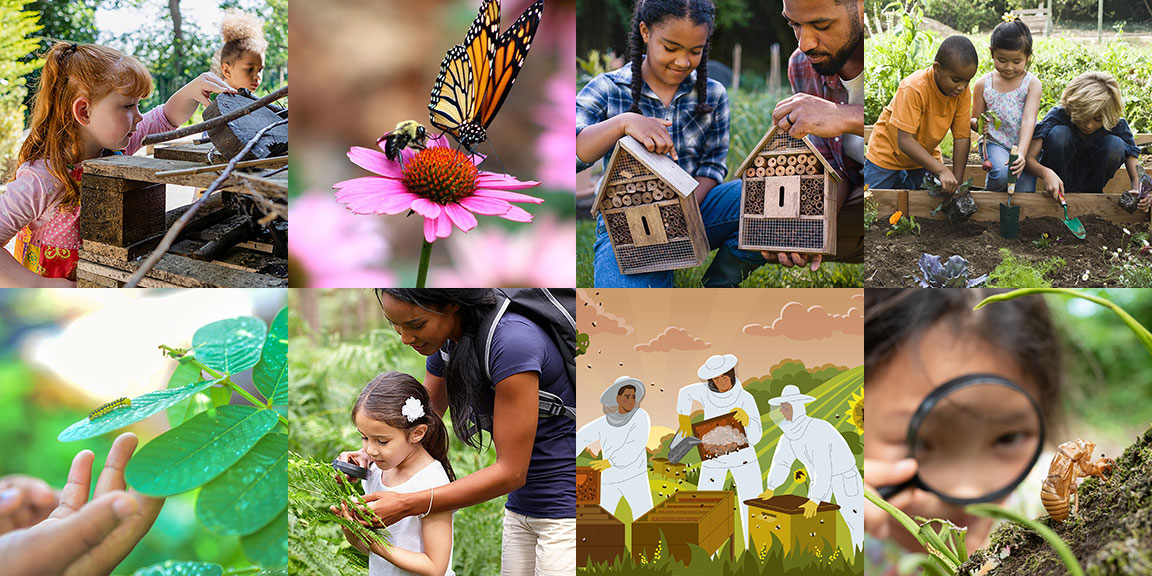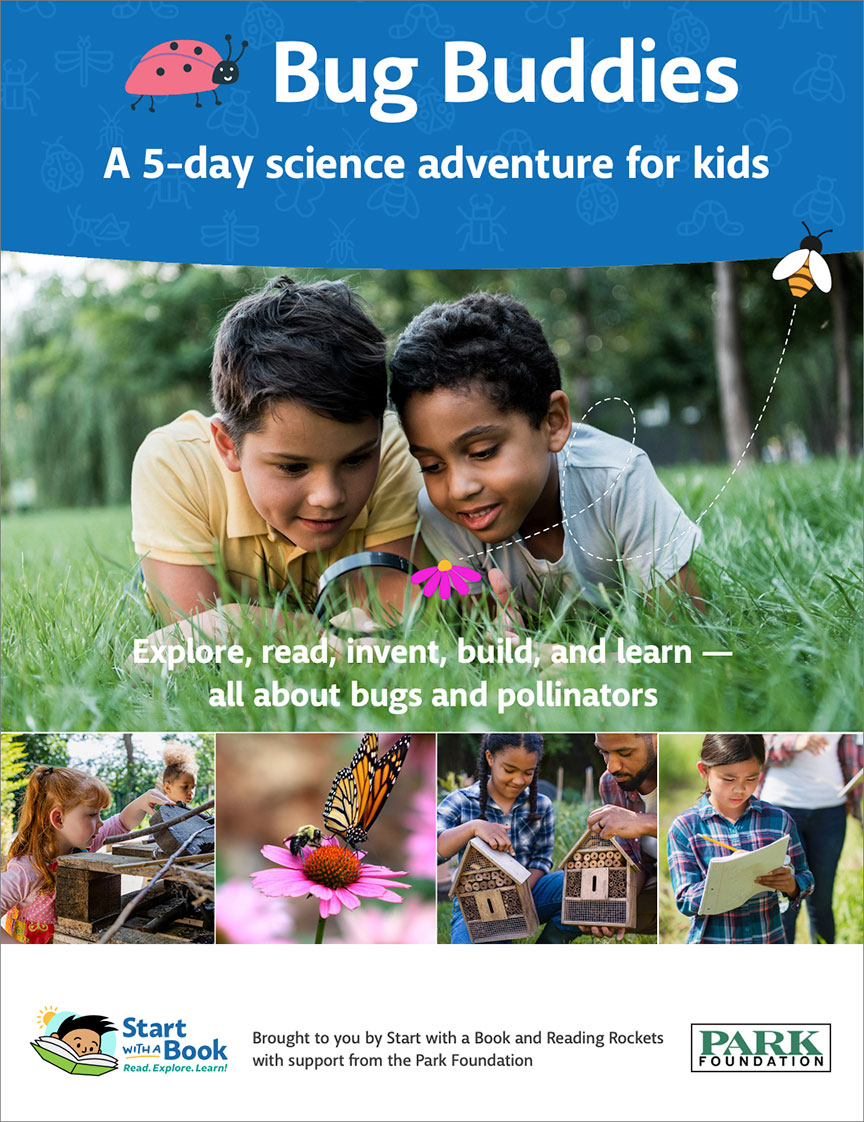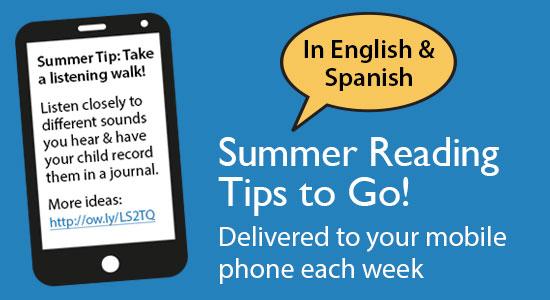
Our STEAM-focused summer and out-of-school-time program is all about the amazing world of bugs — in your community and around the world.
Get the buzz on insects! Learn about bug babies and the insect life cycle, take the exoskeleton challenge, build a bug, be a bee, explore biomimicry (and invent your own nature-inspired innovation), discover helpful insects and their role in our world ... and much more.
Did you know that there are more insects on Earth than any other kind of animal — more than 200 million for each human on the planet! Insects help plants grow, build healthy soil, and are a key part of the food chain, providing food for some creatures and eating others.There’d be no coffee, honey, or chocolate without our bug friends ... imagine that!
Bug Buddies combines hands-on activities with great fiction, nonfiction and even poetry — books such as Name That Bug!, Cicada Symphony, Bee Dance, How to Build an Insect, Behold Our Magical Garden: Poems Fresh From a School Garden, The Book of Brilliant Bugs, and Invented by Animals: Meet the Creatures Who Inspired Our Everyday Technology — inspiring kids to dig deep into fascinating facts about insects and to think about their role in our lives.
How do YOU feel about bugs? Many kids love them. Some kids find insects beautiful and interesting. Others might find some bugs scary. Bug Buddies provides opportunities for kids to gain a fresh appreciation for bugs which can help reduce anxieties — and with the daily Bug Out adventures, get kids exploring the natural world in new ways.

Our free, 5-day toolkit for educators, summer program leaders, and parents includes dozens of carefully chosen fiction and nonfiction books, hands-on activities, writing ideas, and apps and websites to deepen a child's learning.
Join us ... to explore, read, write, play, invent, and learn — all about bees, butterflies, beetles, and other bugs.
Here’s what kids will learn about, day by day
- Day 1: What Are Bugs?
What makes an insect an insect? Learn about insect anatomy and characteristics, especially the exoskeleton. - Day 2: Bug Life
Learn about bug life cycles and their crucial role in food chains and food webs. - Day 3: Bug Builders
Dive deep into bug habitats and adaptations. Learn where bugs live and how they adapt to their surroundings. - Day 4: Bugs in Our Lives
Explore pollination and decomposition. Without insects, we'd be without our favorite foods and have poor quality soil and lots of dead plants and animals lying around. - Day 5: Bugs and People
Bugs inspire art and science. Engineers and scientists solve many problems by imitating bugs' abilities and traits. We also benefit from many helpful bugs.
A 5-day program that fits your schedule!
Bug Buddies is flexible! Use the materials each day for five days in a row, or once a week for five weeks (or any other way you like) to add hands-on learning to your summer programming. The materials are designed for elementary-aged children, but can be adapted for older or younger kids.
Get your free Bug Buddies toolkit

The toolkit includes 5 topics for exploration through fiction and nonfiction books, hands-on activities, new vocabulary, and fun writing prompts. Each topic also includes recommendations for kid-friendly digital media — websites, podcasts, apps, and video. In the Appendix you'll find a list of bug words, and printable templates for Bug Buddies name tags, journal covers, and certificates.
Complete Toolkit
Download and print the PDF.
Day by Day
If you want to choose individual sections of the Bug Buddies toolkit, just select any of the links below to download and print a PDF.
- Introduction
- Day 1: What Are Bugs?
- Day 2: Bug Life
- Day 3: Bug Builders
- Day 4: Bugs in Our Lives
- Day 5: Bugs and People
- Appendix
Note: Be sure to view and print from Adobe Reader (or an alternative PDF reader), not your web browser.
Getting ready: tips for using the Bug Buddies toolkit
- Each day has an emphasis on one or more topics related to insects. You’ll find an introduction to the concepts covered and recommended books for each day, as well as a list of questions to guide explorations and activities.
- Start by gathering books from the list provided from your library.
- Choose fiction and nonfiction books from the list provided.
- Read them through before you read them to the kids so you know what happens, and can spot any unfamiliar words or concepts you’ll need to explain. Also, look for places to ask questions while you're reading to engage listeners.
- Think about which other parts of the program you’d like to do after reading the books. An activity is always a good idea, and you may also want to include writing, exploring related websites, videos and apps, and heading outside, too.
- Familiarize yourself with local insects and places nearby to go to find them.
- Get connected to scientists and others who work in entomology in your area
- Check too with your local college or university to see if they have an entomology department or find out what insect-related exhibits a local science, natural history, or children’s museum might have.
Learning with the kids
- Introduce the theme for the day and ask kids what they know about it.
- Start with a book. This is key, especially for kids who may be fearful of insects. Read one or more of the books aloud and ask questions. Listen carefully to the kids’ answers. By reading to them and asking questions, you’ll get them thinking about bugs and what they want to learn, as well as helping them see that most insects aren’t a real threat. You’ll also increase their understanding and excitement, and get them ready for real-life situations with bugs.
- Read another book and repeat.
- Choose a hands-on activity to let kids explore theme. By doing an activity, the kids get to use the concepts and new words they have learned.
- Look for a local connection. How can you connect the ideas in the books or the activities with the kids’ personal experience? Think about walks outdoors, visiting a beekeeper, or checking on the effects of insects on animal habitats or gardens.
- Keep asking questions throughout and listening carefully to the kids’ answers.
- Encourage kids to write about what they are learning or curious about by using one of the writing prompts in this toolkit, and by keeping a Bug Journal for observations, drawings, questions, and creative writing activities.
- Provide access to books about the topic for kids to look at on their own.
- Share digital media with kids (websites, apps, videos, and games) that they can use to learn more about the topic and give kids time to try them out.
- Take a field trip to further explore your topic for the day or theme for the week. Activities for each day will include a Bug Out! with special attention to observing insects.
You can choose any of the components, all of them, or just one or two, but we recommend that you always Start With a Book!
Bug Buddies toolkit authors
Rachael Walker
Rachael has more than 30 years of experience developing partnerships with nonprofit organizations, corporations, and public agencies to benefit children and families. She launches national campaigns, coordinates special events, and develops original content for the National Education Association, Random House Children’s Books, PBS, and WETA’s Learning Media initiatives (Reading Rockets, Colorín Colorado, and AdLit.org). Visit Rachael at Belle of the Book.
Eileen Hanning
Eileen Hanning, M.Ed., has more than 20 years of experience designing reading curriculum for underserved kids and training for their parents and social service providers about reading and child development. Her passion for children’s books and hands-on learning has lead her to review children’s books, learn, research and write about education, child development and toxic stress, and to create her own consulting company, ReadLearnReach, where she serves a variety of clients with their curriculum, training, children’s book, and writing needs. She has developed curriculum for Random House, WETA, Reading Is Fundamental, the Girl Scouts of America, and Red Comet Press, and researched and written white papers for Tales2Go and Girls on the Run of Northern Virginia.
Alonso Abugattas, Jr. (expert reviewer)
Alonso is the Capital Naturalist on social media and Natural Resources Manager for Arlington County Parks in Virginia. He has 30+ years as a professional naturalist.



